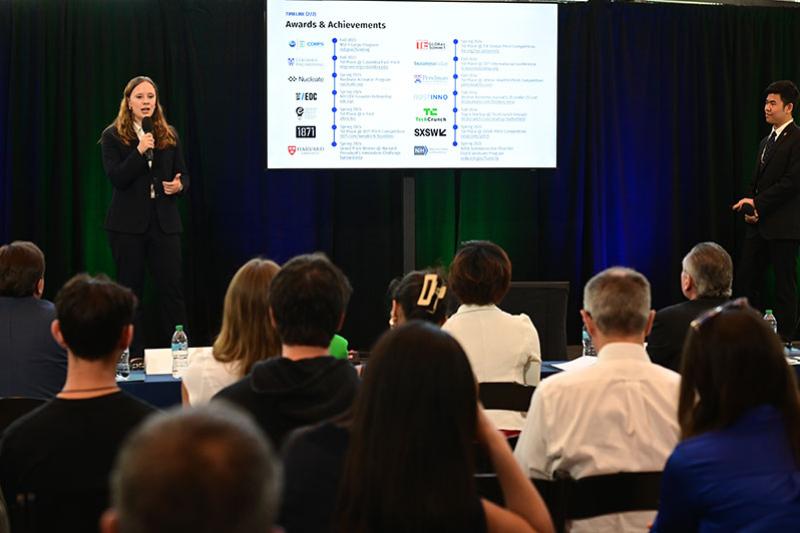Rapid test for deadly lacing agents wins top prize at 2025 Business Model Competition

MabLab, a Harvard/Columbia-based student startup that produces quick and accurate test strips to detect deadly lacing agents in drugs and drinks, took home first place honors and the grand prize of $75,000 in the 2025 Tulane Business Model Competition.
The competition, which celebrated its 25th anniversary this year, is an annual presentation of the Albert Lepage Center for Entrepreneurship and Innovation at Tulane’s Freeman School of Business. The final round took place March 25 in the Goldring/Woldenberg Business Complex on Tulane’s uptown campus.
More than 100,000 people in the U.S. die each year from taking laced drugs. MabLab’s IP-protected test strips allow users to quickly and accurately detect the presence of the five deadliest lacing agents -- fentanyl, methamphetamine, benzodiazepine, xylazine and nitazene -- in drugs or drinks.
“Our company was inspired a little over three years ago after we lost a close mutual friend of ours to a drug overdose,” said MabLab co-founder Vienna Sparks, currently an undergraduate at Columbia University. “Since then, we realized that there was a huge gap in the market for testing for multiple substances simultaneously — just a really good, all-inclusive diagnostic solution for laced drugs and spiked drinks. We really wanted to solve that issue.”
Competition judge Shelly Porges, co-founder of Beyond the Billion, a global consortium of venture funds focused on women-founded companies, said MabLab stood out to judges for a few reasons.
“They had the clearest product success potential because, from a product point of view, you use it right on the spot,” she said. “They also had the [strongest] team, and we all thought the team was important. They’re also solving a very real problem, and I think the connection between the problem and the solution was the most clear [of the three finalists].”
MabLab is currently producing the strips and distributing them through university health centers. Sparks said the company hopes to use the prize money to scale up its supply chain.
“We have a lot of demand,” she says. “We want to be able to meet that and deliver a product that’s great to our customers.”
Exactics, a startup with roots at Tulane and the University of Chicago, won second place and a prize of $30,000 for QuickLyme, an affordable lab-free rapid test that enables users to test ticks on themselves or their pets for the presence of Lyme disease.
TranscribeGlass, a startup based at Cornell and Yale universities, won third place and a prize of $20,000 for developing the world’s first smart glasses designed expressly for people with hearing loss, providing real-time subtitles for conversations.
Reflecting on the competition's milestone anniversary, Lepage Center Executive Director Rob Lalka noted that the competition has put more than $1.5 million into student-led startups over the last 25 years in addition to connecting those student entrepreneurs with valuable mentors, advisors and investors.
“For the first time this year, we brought back some of our past winners to talk about their experience in the competition,” said Lalka. “Hearing them talk about how it helped them get to the next level — through both the prize money and the personal connections — was really meaningful. It’s privilege for us to play a role in the development of so many outstanding companies, and it’s a great learning experience for our students to see the incredible things being accomplished by student entrepreneurs.”
To see more photos from the competition, visit the Freeman School’s Flickr page.
Interested in advancing your education and/or career? Learn more about Freeman’s wide range of graduate and undergraduate programs. Find the right program for you.
Other Related Articles
- Deseret News: Californians are asking, is it time to raise taxes on the rich?
- The Wall Street Journal: For Trump, the Warner Megadeal Talks Are All About CNN
- NBC News: Elon Musk has left the White House, but he hasn't left politics behind on X
- NOLA.com: Louisiana venture capital firms, once an afterthought, are big funders of local startups now
- Forbes: Your Pitch Deck Doesn’t Close the Deal - Your Power in the Room Does
- New Orleans startups bet on AI as Tulane expands its survey statewide in 2026
- Alum launches fund to invest in Tulane-affiliated startups
- Techstrong.ai: Musk Sues OpenAI, Apple For ‘Anticompetitive Scheme’
